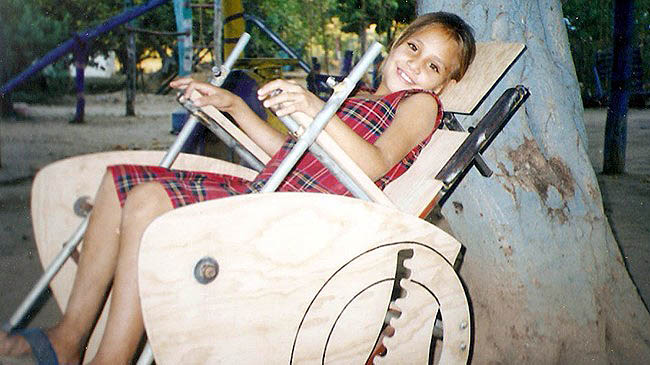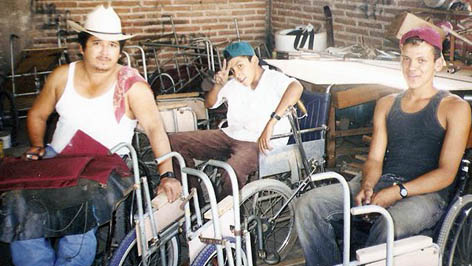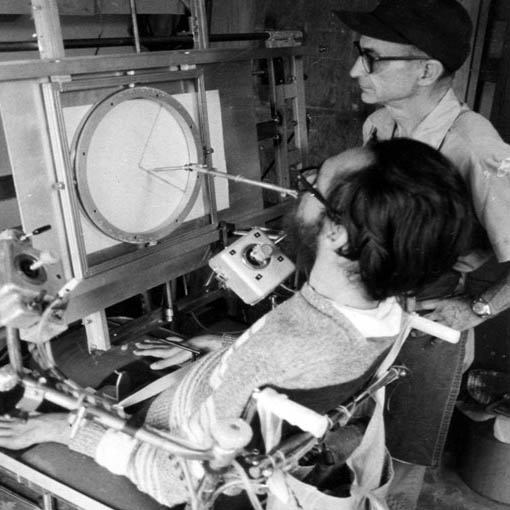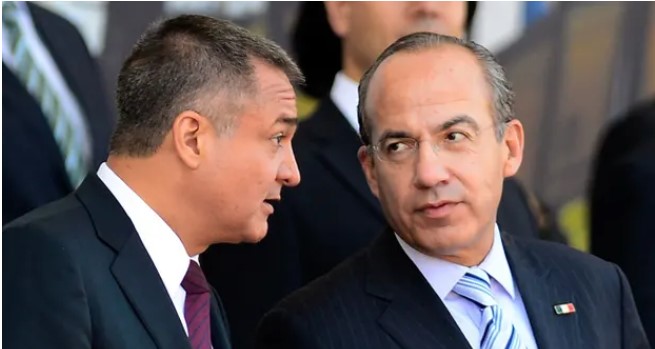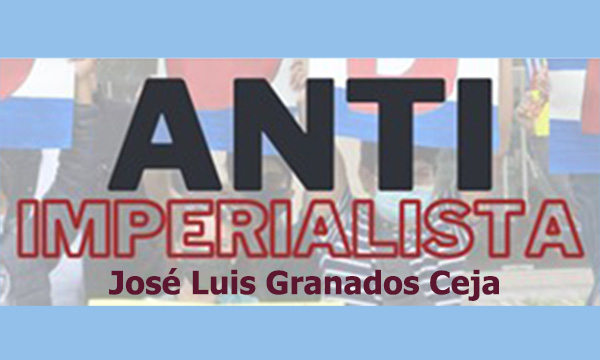|
|
|
|
The weekly newsletter of the México Solidarity Project |
|
|
|
Online at mexicosolidarityproject.org |
|
February 22, 2023/ This week's issue/ Bruce Hobson, for the editorial team |
|
|
Fewer Limbs, But Not Any Less Humanity! |
|
In the 1980s I left my job as a carpenter at UCLA to work with Project Projimo, a rural rehabilitation project in western México. Among the project’s key team members: paraplegics, who did consultations with children, and quadriplegics, who worked in the wheelchair shop.
“You’re working with me!” one team member told me early on and then proceeded to teach me how to clean and pack deep pressure sores on two quads living long-term on site. Project Projimo became a formative moment for me. I learned how poor disabled people can transform their physical lives — and social reality.
Most of us know or live with a person with a disability. Being able-bodied, we’ve come to understand, will always be a temporary condition for all of us! Over one billion people — one in six worldwide — currently live with a significant disability. And those lives can be harsh. In poor countries, 50 percent of those injured at the lower-spine level, paraplegics, die in the first five years after injury. And of those with a neck-level injury to the spine — quadriplegics — over 95 percent die within the first two to five years after injury.
Those stats don’t have to be so grim. In this week’s Bulletin, we’re featuring Juan Antonio Heyer Banda, a journalist who has written a powerful biography about his quadriplegic brother Arturo and his remarkable 49 years of life after a diving accident.
Arturo achieved what far too few people in wheelchairs do. Through his family’s insistence and assistance, coupled with his own creativity and dint of will, Arturo lived a normal life and helped other people with disabilities live fuller lives as well.
As a non-disabled person, my experiences with a team of disabled friends gave me a deep sense that physical ability does not make some of us more equal than others. And my work with the children of Project Projimo showed me that central to what we need in life will always be...love. |
|
|
|
Don’t miss an issue. Subscribe to the weekly México Solidarity Bulletin! |
|
|
|
|
Bringing Ability to Those with Disabilities |
|
Juan Antonio Heyer Banda, the author of Arthur, A Productive Life Without Moving a Single Finger, freelances for several regional newspapers in Jalisco, México, where he lives in a sustainable organic farming community. Heyer Banda has recently been working to create links with foundations promoting the improvement of living and working opportunities for disabled persons. You became interested in disability issues because of your brother. Tell us about him. My brother Arturo had a diving accident at age 17, losing sense and movement from the neck down. That event put us all — brothers, sisters, mom and dad — working around him to compensate for his disadvantage. |
|
|
Our family involvement went well beyond just supplying the essentials. We provided Arturo with as much aid as required to keep him functional, with opportunities for study, leisure, and travel equal to what any of us enjoyed, no more but no less.
My mother insisted that my brother go back and finish high school. He later earned a degree in mechanical engineering. |
|
My inventive father made a wheelchair from scrap wood and cushions. He and Arturo then invented a mouth stick. He could move his head and. with the stick, he could turn the pages of a book. With different telescopic endings on the stick, he could change diskettes in his computer’s CD player, paint, and manipulate a turntable desk and an easel they also invented.
Without those devices, my brother might only have one thing he could “reach.” These devices all multiplied his ability to interact with different objects. |
|
|
Photo: David Werner. Wheelchair from Proyecto Projimo |
|
What kind of health care did people with physical disabilities find available then and what do they find now? State and federal budgets in México remain limited. We are a third world country. Even so, I haven’t heard of a disabled person being denied emergency attention in public clinics or hospitals. A different story with private hospitals. In México, the Cruz Roja— Red Cross — and the government’s Cruz Verde, or Green Cross, cover 99 percent of the emergency services in the accidents that mark the start line for most disabled persons. We’ve seen major changes since 2018, a “before” and an “after.” The new federal administration is dismantling the corruption and pharmaceutical mafias that once dominated the disability landscape. Former administrations degraded public health services, with the intention of trashing the image of these services to facilitate the privatization of the entire health system. In those years, the authorities staffed public hospitals with fewer nurses and doctors than private hospitals and let medications get siphoned off for sale on the black market. As for rehabilitation programs, the Desarrollo Integral de la Familia — the DIF — has been providing them, but far below the level needed. Nonprofit organizations have had to take care of much of the necessary rehab activity. But the current Mexican government has just announced the creation of rehabilitation centers for disabled persons in rural zones. This move represents a 180-degree turn from the privatization policies of the last six federal administrations. I will join my efforts with this new policy and hope to see it spreading all over México and beyond our borders. |
|
Are people with disabilities getting more integrated into social and economic life?
Sad to say, but many disabled persons still end up selling candy on sidewalks, as practically beggars, getting way more than the value of the candy being “sold.” On the other hand, in recent years I’ve seen secretaries, assembly workers, and bureaucrats, as well as people fixing cellphones and laptops, working from wheelchairs.
I consider Project Projimo, north of Mazatlán in Sinaloa, a model of what can be done. David B. Werner founded this project in 1979, and it’s still operating. This effort has the “plus” of involving disabled people, along with the whole community, in learning how to take care of and rehabilitate themselves. |
|
The program also helps disabled people design and build their own crutches and wheelchairs, their own carts, orthopedics, and prostheses. This strikes me as the most efficient way to deal with disabled persons’ physical and social rehabilitation. |
|
|
Photo: David Werner, Project Promo |
|
Your brother Arturo died in 2012, but you’re working to bring his inventions to more people, right?
Only recently, I came across a person I have wanted to meet for a long time, that David Werner whose work I just mentioned. He took me to all the places in Sinaloa where he works with disabled persons and their families and showed me efforts such as Project Projimo. This trip revived my idea of turning Arturo’s inventions over to someone who could make, promote. and sell them to benefit many people who would definitely become more functional with their use. |
|
David also told me about the “replica” of his project in Nogales, Sonora, ARSOBO, A.C., an effort run by foundations in Tucson, Arizona.
I’ve visited the project and talked to the people there. We’ve already shipped them a motorized easel and several “mouth sticks” designed to extend the independence and functionality of a quadriplegic person. Once I assembled these devices and showed how they work, the people in Nogales seemed to be enthusiastic about manufacturing them. Arturo’s legacy will live on! |
|
|
|
Calderón, García Luna, and the War Between Narcos |
|
|
Former Mexican president Felipe Calderón, right, and his security chief Genaro García Luna. Photo: AFP |
|
As the bodies piled up and the blood continued to spill during former President Felipe Calderón’s so-called “war on narcos,” observers couldn’t help but notice that state security forces seemed to be targeting some organized crime groups over others. |
|
Even at the time, anyone who bothered to look at the evidence could hardly miss the Calderón government’s favoritism of the Sinaloa Cartel. How blatant did Caldrón’s de facto alliance with the Sinaloa Cartel become? Many observers starting calling Calderón’s drug push a war between narcos instead of one waged against them. |
|
|
Now the narco-corruption trial of Genaro García Luna in the United States has brought to light the extent of that alliance. García Luna served as Calderón’s security secretary, a cabinet-level position, and operated as the architect of the ex-president’s security strategy. He came to be called, quite literally, Mexico’s “super cop.”
According to US prosecutors, this “super cop” received over $200 million in bribes from cartel operators like Ismael “El Mayo” Zambada, who testified he personally delivered $5 million to García Luna. These millions all came on top of $746 million dollars that Pablo Gómez, the chief of Mexico’s Financial Intelligence Unit, now charges that García Luna stole from public funds.
In other words, people close to Calderón — like García Luna — got fabulously wealthy while Mexicans got destruction in return.
Sums up Mexican journalist Alejandro Páez Varela: “A country was subjected to a war, entire families were subjected to living in danger, thousands of people dead, mothers looking for their disappeared children’s whereabouts, over the want of money.”
Calderón’s war between narcos cost México more than a sense of peace, as Washington Post reporters Mary Beth Sheridan and Nick Miroff have noted. After López Obador’s victory in the 2018 presidential election, his transition team would end up “astonished to discover how much the US government quietly pulled levers in the country.”
Despite all this, coverage of García Luna’s trial inside México has been demonstrably poor, with outlets treating it more as spectacle than an indictment of Calderón’s legacy. This should be no surprise. Mexico’s corporate media enjoyed a close relationship to Calderón, receiving millions in advertising during his administration. Or perhaps papers like El Universal have opted to tread carefully in their coverage after one witness accused the outlet of receiving bribes from García Luna in exchange for favorable coverage.
US prosecutors, meanwhile, presented a weak case during the just-concluded trial, presenting no “smoking gun.” As a result, the jury may not return a guilty verdict. But regardless of the trial’s outcome, Mexicans continue to live with the consequences of the decisions made during Calderón’s time in office.
Fortunately, under AMLO, the government has abandoned the Calderón war rhetoric and committed itself to securing peace. For the sake of the millions of Mexicans still living with the consequences of the war between narcos, peace can’t come soon enough. |
|
José Luis Granados Ceja, a Mexican freelance journalist, is currently studying human rights and popular democracy at the Autonomous |
|
|
|
Recent news reports and commentaries, from progressive and mainstream media,
Ben Norton, México’s AMLO Announces Campaign Against US Blockage of Cuba, Denounces Neoliberalism, Sheer Post. President López Obrador has announced México’ will lead an international movement to end the US government’s “inhumane” blockade.
Vanessa Félix, ¿Qué pasa con la economía en México?, sdpnoticias. Desde el 2018 la andanada mediática que favorece a la oposición ha cantado que todo va mal y que irá peor. Sobra decir que nada de eso ha sucedido.
Jake Johnson, US Attempt to Sabotage Mexico's GMO Corn Ban Denounced as ‘21st-Century Imperialism,’ Common Dreams. Environmental groups have accused the Biden administration of putting the profits of big agribusiness over public health and critical pollinators by attempting to obstruct the Mexican government's ongoing push to ban genetically engineered corn.
Presidenta de Perú denuncia que México se niega a entregarle la jefatura de la Alianza del Pacífico, Animal Politic. Dina Boluarte señaló que AMLO se niega a entregar la Alianza del Pacífico por “seguir apoyando” al expresidente Pedro Castillo.
Jenna Hoffman, México's GMO Corn Ban Boils Over as US Turns Up the Heat, AgWeb. México plans to phase-out GMO corn for animals and manufactured products, according to a statement made last week by the economy ministry. Most US corn exports to Mexico ago for livestock feed.
Piden a ONU investigar a minera Ternium por desaparición de defensores en Michoacán, Desinformémomos. Los organizaciones de derechos humanos presentaron un llamamiento urgente a grupos especiales de Naciones Unidas para tomar medidas ante la desaparición de los defensores Ricardo Lagunes y Antonio Díaz, entre las que se encuentra la investigación de la minera Ternium, contra la que luchaban ambos en Michoacán.
AMLO says no president has been attacked the way he has been attacked by the press, México News Daily. Some 98 percent of the media, says President López Obrador, opposes his presidency, But, he adds, México has the lowest global levels of political illiteracy, leaving people are “very difficult to manipulate.”
Sheinbaum aventaja a Ebrard rumbo candidatura de Morena para 2024: Enkoll, Proceso. "El canciller Marcelo Ebrard pierde apoyos y la jefa de Gobierno de Ciudad de México se mantiene como puntera a pesar de las crisis por los accidentes en el metro capitalino", refirió el diario.
Mexican automotive manufacturing, exports keep accelerating, México News Daily. México saw nearly a 10 percent overall increase in vehicles produced for export in the first month of the year, a strong start after a record year in 2022 when México became the leading auto exporter to the U.S for the first time ever.
Esta es la presunta razón por la que EU decidió proteger “al grupo de El Chapo”, según Fernández Noroña, Indigo. Gerardo Fernández Noroña habló de los señalamientos en contra del expresidente Felipe Calderón Hinojosa en el juicio de García Luna. |
|
|
The Mexico Solidarity Project brings together activists from various socialist and left organizations and individuals committed to worker and global justice who see the 2018 election of Andrés Manuel López Obrador as president of México as a watershed moment. AMLO and his progressive Morena party aim to end generations of corruption, impoverishment, and subservience to US interests. Our Project supports not just Morena, but all Mexicans struggling for basic rights, and opposes US efforts to undermine organizing and México’s national sovereignty.
Editorial committee: Meizhu Lui, Bruce Hobson, Bill Gallegos, Sam Pizzigati, Courtney Childs, Victoria Hamlin, Agatha Hinman, Steven Hollis, Daniel McCool, Betty Forrester. To give feedback or get involved yourself, please email us! |
|
|
|
Web page and application support for the México Solidarity Project from NOVA Web Development, a democratically run, worker-owned and operated cooperative focused on developing free software tools for progressive organizations. |

